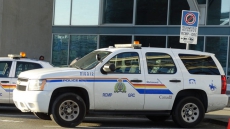Canada needs a new approach to tackle its overdose crisis, says the lead author of a new study that highlights a prevalence of overdoses involving non-prescribed fentanyl and stimulants in British Columbia.
There have been more than 15,000 apparent opioid-related deaths in Canada since 2016.
British Columbia has recorded more than 5,000 deaths from illicit drug overdoses since declaring a public health emergency in 2016.
The study, published on Monday in the Canadian Medical Association Journal, looked at 1,789 overdose deaths in British Columbia between 2015 and 2017 in which the coroner was able to determine the substances relevant to the deaths.
It reported that despite decreases in the prescription of opioids across the province, the death rate from illegal drug overdoses has continued to rise.
Dr. Alexis Crabtree, the study's lead author and resident physician in public health and preventative medicine at the University of British Columbia, says it highlights what isn't working when it comes to tackling the overdose crisis.
"What we found is that this overdose crisis is not driven by prescribed medications and de-prescribing initiatives alone won't solve the overdose crisis," she said in an interview.
In most cases where prescribed opioids were implicated in a death, the toxicology report also flagged the non-prescribed opioids in the person's system, Crabtree added.
The study's findings also highlight the declining role of prescription opioids and heroin in the overdose crisis and the rise of synthetic opioids and stimulants.
The current strategies on battling the overdose crisis "must do much more" than target de-prescribing opioids, the study concludes.
Men continue to dominate the overdose death toll, making up more than 80 per cent of deaths, with people between the ages of 31 to 49 making up the predominant number of deaths.
One aspect that is often overlooked is the efficacy of methadone and buprenorphine, opioids used to treat opioid addiction, Crabtree said.
The study showed that few overdoses involved people with those opioids in their system, which Crabtree said she believes should make doctors feel more comfortable in prescribing them to drug users.
In B.C., the provincial government expanded the access to a safe supply of prescription drugs near the start of the COVID-19 pandemic due to concerns about the number of overdose deaths arising from isolated drug users.
That program, and subsequent concerns raised over the prescribing of illicit-alternative drugs, prompted the decision to publish the study in the Canadian Medical Association Journal, Crabtree said.
"A question or concern physicians have is 'is the medication I'm prescribing contributing to overdoses?'" said Crabtree. "I can understand why people have that concern. I think these results are really reassuring that prescribed medications are not a driver of overdose risks and supports physicians to prescribe under those risk mitigation guidelines."
She said she agrees with the recommendations of provincial health officer Dr. Bonnie Henry who called for the decriminalization of people who possess small amounts of drugs in a 2019 report.
At the time, Henry wrote that the province "cannot wait for action at the federal level."
She reiterated those recommendations in June 2020, which saw 175 suspected overdose-related deaths.
"COVID-19 has made clear the government can act in a very fast and effective way when it prioritizes a response to a public health emergency," said Crabtree. "I would love to see that same effectiveness applied to responding to the overdose emergency and protecting the health of people who use drugs."
More access to overdose prevention and supervised inhalation sites should be some of the next steps forward both in B.C. and across the country, she added.
The federal government launched a national consultation on supervised-consumption sites last week, seeking comments from a variety of Canadians, including those who operate the sites and those who use them.



